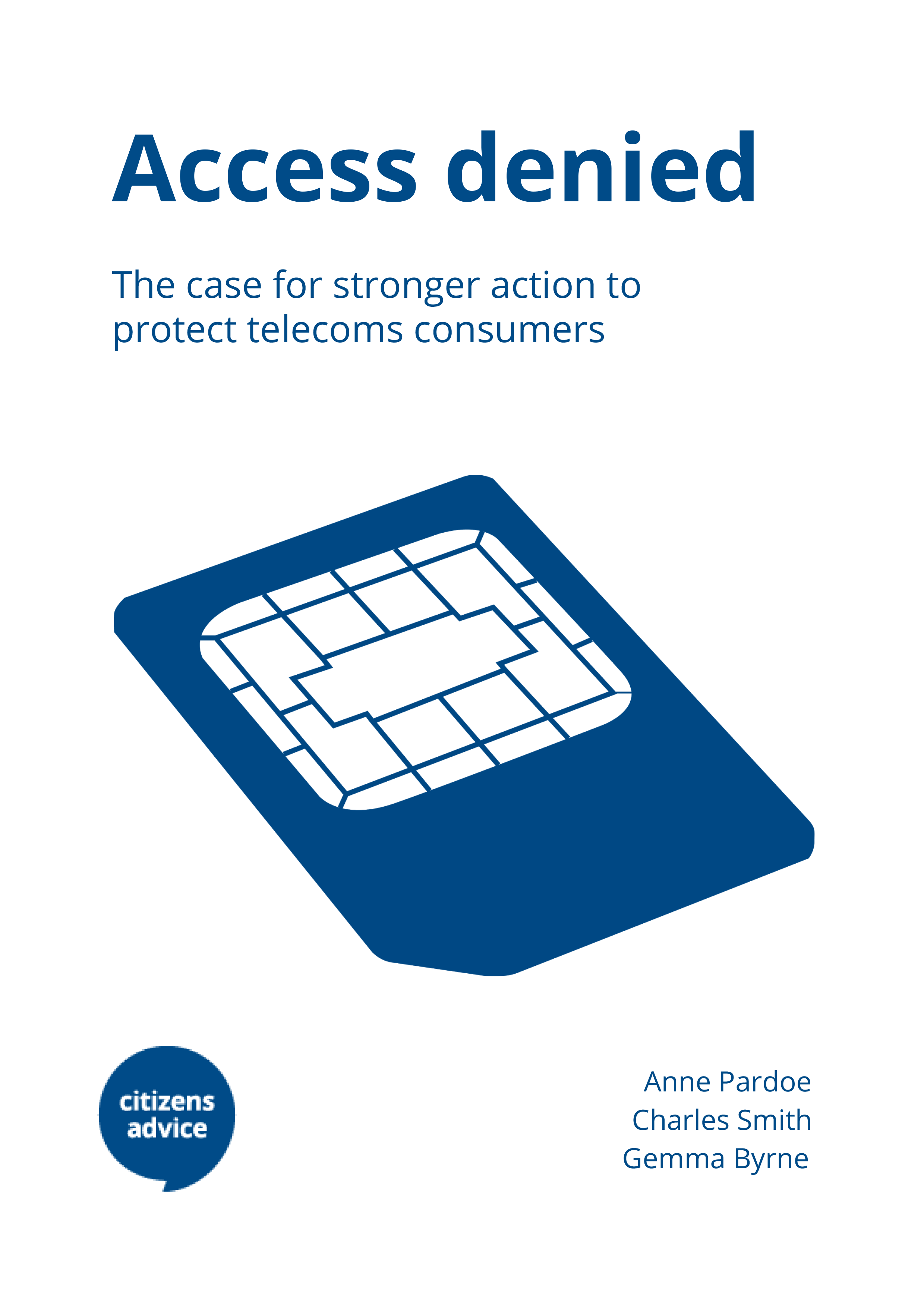Access denied: The case for stronger action to protect telecoms consumers
It is no longer contentious to say that mobile phone and broadband services are essential. These services are increasingly our first, or even only, gateway to accessing public and private services, from online banking to making a benefit claim. They are also vital to the success of the digital economy, allowing us to work more flexibly and buy goods and services online.
 In this context, it is vital that people have access to affordable, reliable telecommunications services which meet their needs. At first glance, the signs are positive. Consumers have access to powerful devices and services at prices which are affordable to all but those on the lowest incomes. But what happens when we look below these high level trends at the experience of the consumers using these services?
In this context, it is vital that people have access to affordable, reliable telecommunications services which meet their needs. At first glance, the signs are positive. Consumers have access to powerful devices and services at prices which are affordable to all but those on the lowest incomes. But what happens when we look below these high level trends at the experience of the consumers using these services?
The Government’s forthcoming Consumer Green Paper makes this the ideal time to explore this question. In doing so, Access Denied [ 0.63 mb] draws on new opinion polling, evidence from the Citizens Advice Consumer Helpline, and existing research.
We find a concerning number of consumers experience problems with poor service:
-
6 in 10 (59%) consumers with a home broadband connection reported that they had had a problem with a slow service or a service which stopped working entirely in the last year.
-
Nearly 1 in 10 (8%) are always or regularly unable to access the internet via their mobile phone at home.
-
More than half of those who reported a problem with their mobile or broadband service to their provider (54%) experienced further difficulty resolving it.
The impact of poor quality or disrupted services on individual consumers can be severe and wide ranging - from our ability to keep in touch with friends and family to paying household bills online. 1 in 4 (24%) consumers who had a problem with their broadband service also said that it had had a fair or great impact on their ability to work or study, rising to 1 in 3 (33%) 25-34 year olds.
This new analysis adds to a growing body of evidence which points to worrying levels of consumer problems in telecoms markets. Citizens Advice research in 2016 found that UK consumers experience 27.6 million problems with their phone, TV or internet service each year. This is more than any other market, including energy (7.6 million) and water (1.7 million).
In-depth research by Citizens Advice and others focusing on particular aspects of the market has also uncovered a range of other problems.
-
Broadband customers face a loyalty penalty averaging £113 per year once the term of their initial contract expires.
-
Mobile phone customers continue to be charged up to £38 per month for a phone they already own if they don’t switch when their mobile phone contract is up for renewal.
-
Broadband customers face unreasonable fees when exiting a contract due to poor service or moving house.
Policy makers need to do more to protect telecoms consumers. Welcome progress in several important areas. However, progress in other areas has been slow and tentative.
In developing a consumer protection regime which addresses the problems consumers face, Ofcom and the Government will face 3 key challenges.
-
Bringing consumer protections into line with those found in other essential markets.
-
Identifying and tackling emerging forms of consumer harm in a sector which is changing so rapidly.
-
Ensuring the interests of consumers are fairly balanced against the interests of industry.
A dedicated independent advocate for telecoms consumers, equivalent to those found in other essential markets, could play a crucial role in helping Ofcom and the government to meet these challenges. As well as providing a counter-balance to the strong voice of industry, a well-resourced consumer advocate can shine a spotlight on established and emerging consumer issues and ensure the consumer interest is taken into account as decisions are made which will affect consumers for generations.
The Government has signalled its commitment to improving markets for consumers on a number of occasions. The forthcoming Consumer Green Paper presents the ideal opportunity to deliver on these promises and set out a bold vision for consumers, including in telecoms markets.
Establishing a dedicated consumer advocate to provide a strong consumer voice and improve outcomes for consumers and the wider economy would be an important first step.

